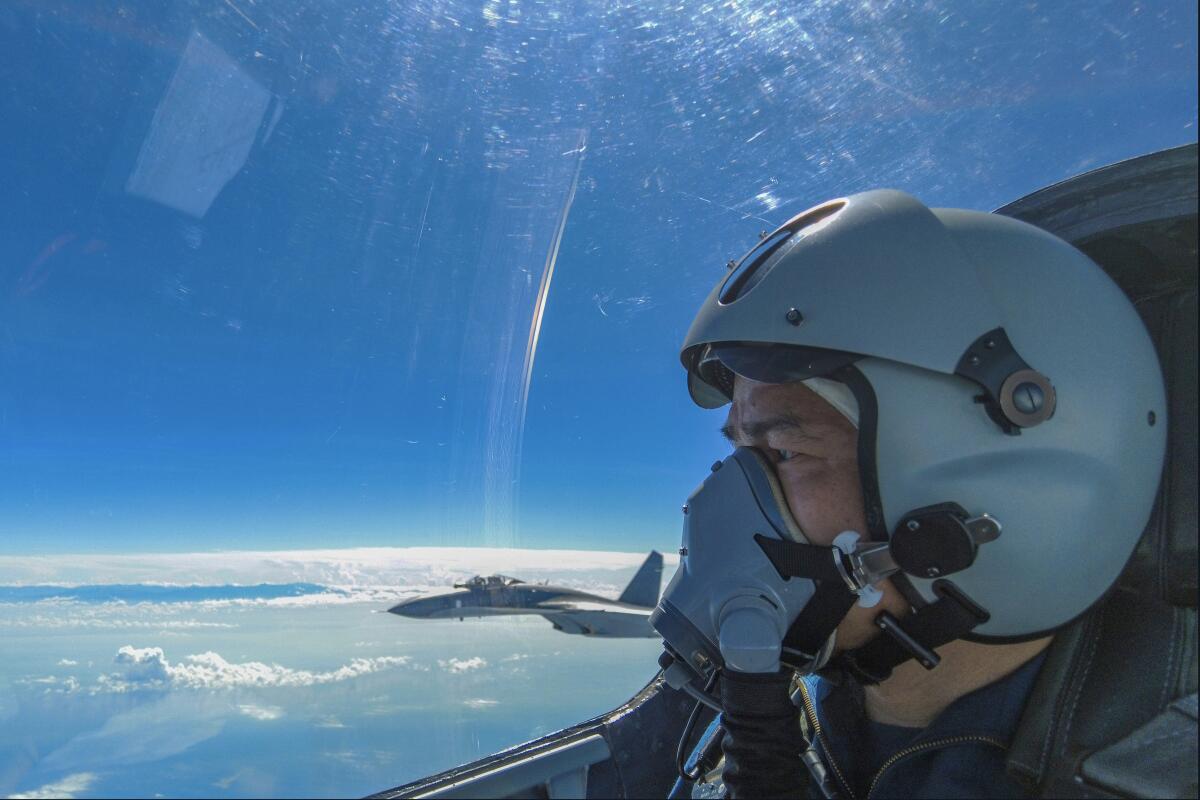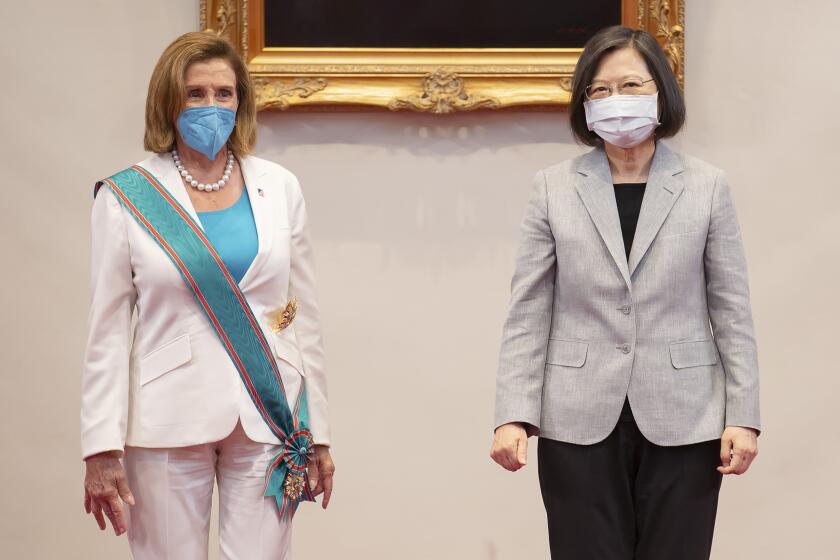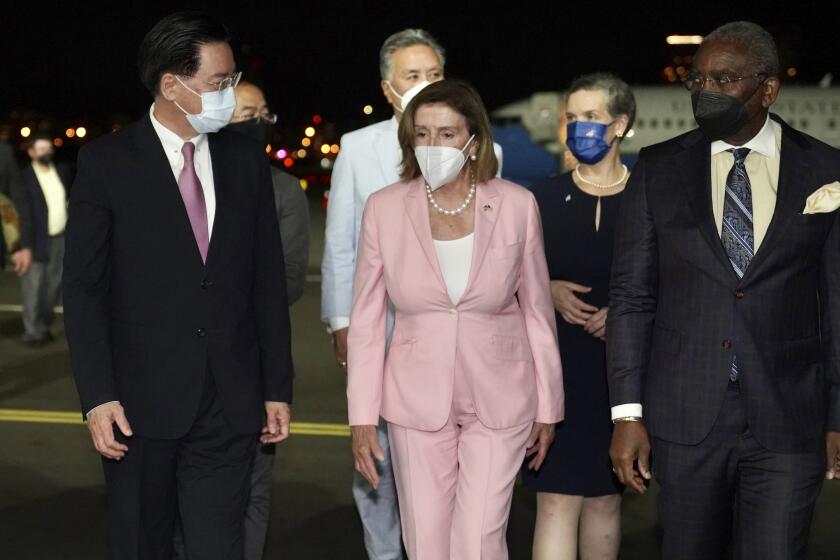China extends military exercises around Taiwan in retaliation for Pelosi’s visit

- Share via
BEIJING — China said Monday that it was extending its threatening military exercises surrounding Taiwan, which have disrupted shipping and air traffic and substantially raised concerns about the potential for conflict in a region crucial to global trade.
The extended exercises would include anti-submarine drills, apparently targeting U.S. support for Taiwan in the event of a potential Chinese invasion, according to social media posts from the eastern leadership of China’s People’s Liberation Army, the military arm of the ruling Communist Party.
The military has said the exercises involving missile strikes, warplanes and ship movements crossing the midline of the Taiwan Strait dividing the sides were a response to U.S. House Speaker Nancy Pelosi’s visit to the self-ruled island last week.
China has ignored calls to calm the tensions, and there was no immediate indication as to when it would end what amounts to a blockade.
On Monday, Chinese Foreign Ministry spokesman Wang Wenbin said China would “firmly safeguard China’s sovereignty and territorial integrity, resolutely deter the U.S. from containing China with the Taiwan issue and resolutely shatter the Taiwan authorities’ illusion of relying on the U.S. for independence.”
Taiwan’s defense ministry said Sunday that it detected a total of 66 aircraft and 14 warships conducting the naval and air exercises. The island has responded by putting its military on alert and deploying ships, planes and other assets to monitor Chinese aircraft, ships and drones that are “simulating attacks on the island of Taiwan and our ships at sea.”
China’s furious response could drive more Taiwanese toward independence and push neighboring Asian nations to strengthen their defense strategies.
Meanwhile, Taiwan’s official Central News Agency reported that Taiwan’s army would conduct live-fire artillery drills in southern Pingtung County on Tuesday and Thursday in response to the Chinese exercises.
The drills will include snipers, combat vehicles, armored vehicles and attack helicopters, said the report, which cited an anonymous source.
China claims Taiwan as its territory and has threatened to annex it by force if necessary. The two sides split in 1949 after a civil war, but Beijing considers visits to Taiwan by foreign officials as recognition of the island’s de facto independence.
Taiwan President Tsai Ing-wen has called on the international community to “support democratic Taiwan” and “halt any escalation of the regional security situation.” The Group of 7 industrialized nations has also criticized China’s actions, prompting Beijing to cancel a meeting between Foreign Minister Wang Yi and his Japanese counterpart, Yoshimasa Hayashi.
For Pelosi, the Taiwan visit is a legacy-building trip that may serve as a capstone to her long record as a critic of China.
China has cut off defense and climate talks with the U.S. and imposed sanctions on Pelosi in retaliation for her visit.
The Biden administration and Pelosi say the U.S. remains committed to the “one-China” policy that extends formal diplomatic recognition to Beijing while allowing robust informal relations and defense ties with Taipei.
The U.S., however, criticized Beijing’s actions in the Taiwan Strait, with White House Press Secretary Karine Jean-Pierre calling them “fundamentally irresponsible.”
“There’s no need and no reason for this escalation,” Jean-Pierre said.
News Alerts
Get breaking news, investigations, analysis and more signature journalism from the Los Angeles Times in your inbox.
You may occasionally receive promotional content from the Los Angeles Times.
In Washington, Taiwan’s de facto ambassador, Hsiao Bi-khim, said China had no reason to “be so furious” over Pelosi’s visit, which follows a long tradition of American lawmakers visiting Taiwan.
“Well, you know, we have been living under the threat from China for decades,” Hsiao told CBS News on Sunday. “If you have a kid being bullied at school, you don’t say you don’t go to school. You try to find a way to deal with the bully.
“The risks are posed by Beijing,” Hsiao said.
On a visit to Myanmar, whose Chinese-backed military government has been accused of killing its opponents, Wang, the Chinese foreign minister, said Washington was “taking the opportunity to build up its military deployment in the region, which deserves high vigilance and resolute boycott from all sides.”
China blocks imports of citrus and fish from Taiwan in response to Nancy Pelosi’s visit but avoids disrupting important technology purchases.
“China’s firm stance” is aimed at “earnestly safeguarding peace across the Taiwan Strait and regional stability,” Wang was quoted as saying by the official Xinhua News Agency.
Meanwhile, Australian Foreign Minister Penny Wong called for a cooling of tensions.
“Australia continues to urge restraint, Australia continues to urge de-escalation, and this is not something that solely Australia is calling for, and the whole region is concerned about the current situation. The whole region is calling for stability to be restored,” Wong told reporters in Canberra, the Australian capital.
More to Read
Sign up for Essential California
The most important California stories and recommendations in your inbox every morning.
You may occasionally receive promotional content from the Los Angeles Times.













